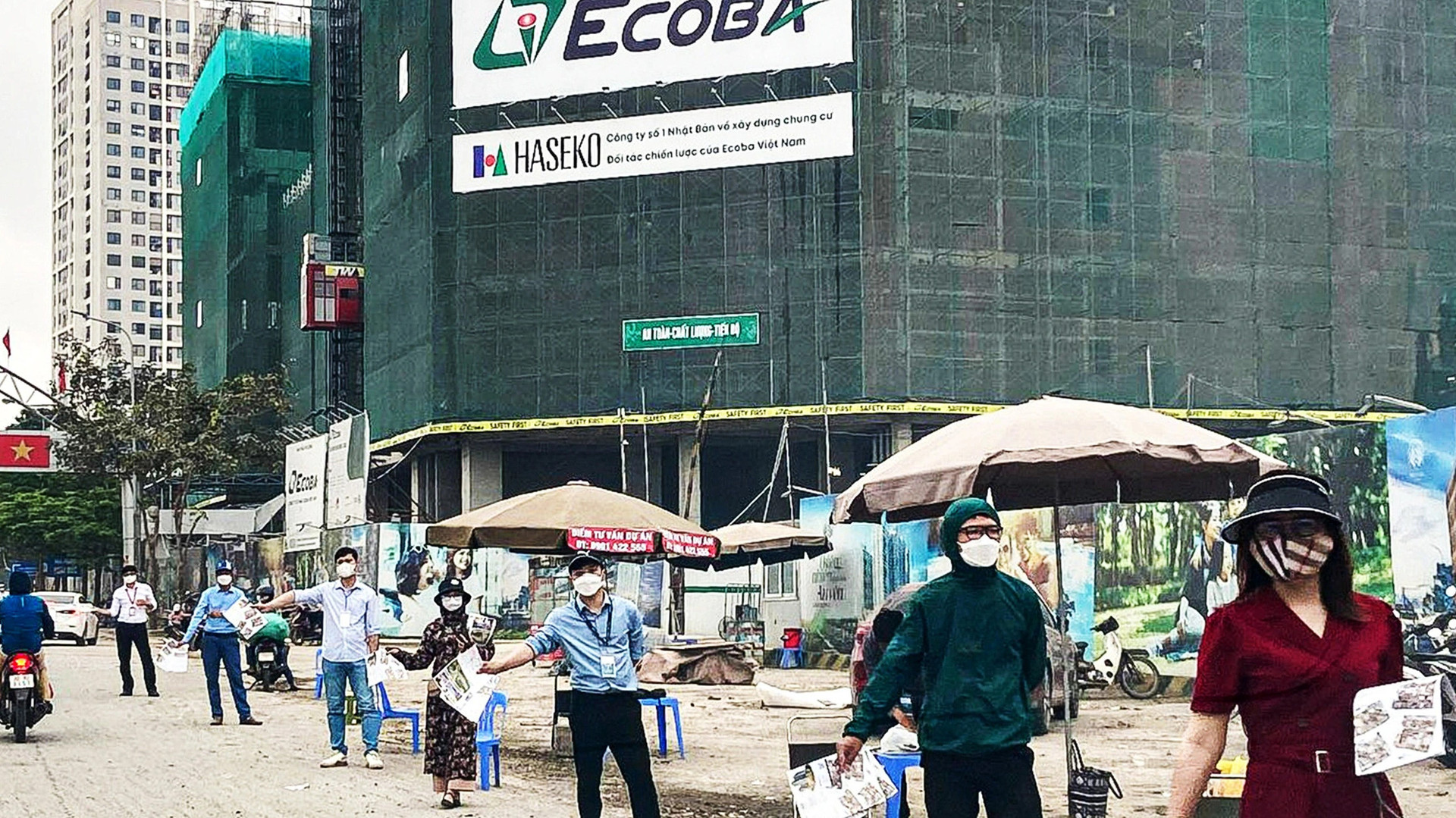Since 1990, in cities like Hanoi and Ho Chi Minh City, real estate prices have increased about 400 times. In mountainous provinces or provinces far from the center, they have also increased about 100 times. This shows that real estate prices have far exceeded the average income of the majority of people.

Youthhad a discussion with Dr. Le Xuan Nghia, member of the National Financial and Monetary Advisory Council on the topic of interest. He warned: Slow policy, "inflated" land prices will become real prices.
*As shared, real estate prices in Hanoi and Ho Chi Minh City increased 400 times after more than 30 years, can you explain more clearly?
- According to a survey by the Institute for Business Development Research - Hanoi Industry and Trade Association (led by Mr. Le Xuan Nghia - PV), from 1990 to now, Vietnam is one of the countries with the highest increase in real estate prices in the world; in Hanoi and Ho Chi Minh City, it has increased about 400 times.
In mountainous or remote provinces, housing prices have also increased by up to 100 times. Meanwhile, in surveys in New York State (USA), Seoul (South Korea), and Paris (France), housing prices have only increased by about 100 times.
For example, my family, in 1990 I bought a piece of land for 56 million VND in Cau Giay District (Hanoi), now someone has offered to pay, if I sell it, I will get more than 20 billion VND. The prices of houses on main roads in central districts such as Ba Dinh or Hoan Kiem (Hanoi) have increased even more.
According to data released by the Ministry of Planning and Investment, the size of Vietnam's economy by the end of 2023 is estimated to reach about 10.22 million billion VND (equivalent to about 430 billion USD). Our country's GDP per capita is 101.9 million VND/person/year (about 4,284 USD/person/year).
While the current average GDP per capita growth is about 6-8%/year, if inflation is deducted, it is only 4-5%/year. Thus, it can be seen that the average GDP per capita in 1990 was estimated at about 100 USD/person/year, which has increased more than 40 times, while housing prices in some places have increased 400 times in the past 33 years.
In Hanoi and Ho Chi Minh City alone, although incomes are high, housing prices have increased about 60-70 times compared to the average GDP of the people.

*In many big cities, real estate prices have increased dozens of times compared to the income of the majority of people. Do you think this is worrying?
- In the early 1990s, 1 tael of gold cost about 2.5 - 2.8 million VND, but now it has only increased about 30 times. Gold is a very good measure of inflation because domestic and international gold production is very stable, while the amount of money issued is high.
For example, in the US, the amount of money printed each year is about 3.5 - 4% and in some other countries it is higher, the amount of money printed is 3 times the amount of gold.
Thus, it can be seen that the growth rate of real estate is too terrible compared to the growth rate of people's income. For example, a family that saves about 10 million VND per month will have to spend dozens of years to own a few dozen square meters of apartment in the central districts.
Housing prices compared to the income of the majority of people exceed 30 times, there is a risk of a real estate bubble bursting, 35 times has a huge impact on the economy. Currently in China it is about 35 times, however some of our big cities are even twice as high.
Supply and demand do not meet, the bubble bursts very dangerously, causing prices to collapse and making it impossible to trade, and businesses cannot sell their goods. The lending bank revalues the assets, and the value is very little.
Homebuyers borrow money from banks, the collateral value is no longer the same as before and bad debts of banks increase. In general, if the real estate bubble bursts, it will cause the banking and financial system to stagnate, businesses to go bankrupt, and homebuyers to default.
* So sir, how can we overcome difficulties and bring housing prices closer to people's purchasing power?
- The property market is always like that, it will "inflate" first, for example "inflate" once but we have measures, we will lower the house price. If in the long run we cannot meet the supply, the "inflated" house price will definitely become real. At that time, it will be very difficult to pull it down because many people bought at a loss or "threw money" into investment, the mentality will not let go.
At several meetings, the Prime Minister directed to increase supply, remove legal difficulties for businesses, and release capital for the market. In my opinion, we need to remove difficulties for projects in large cities such as Hanoi and Ho Chi Minh City first.
Hopefully, the Land Law, the Real Estate Business Law, and the Housing Law will be implemented by the National Assembly soon from July 1. The Land Law with financial regulations such as compensation prices, compensation mechanisms, and land use rights transfers are very important to form housing projects. With prices based on market principles, the compensation story will be faster and more open.
The Housing Law also has many new breakthrough contents such as policies on social housing, development of workers' accommodation and housing development for armed forces... Besides, it creates a legal corridor, encouraging investors to participate in renovating old apartment building projects.
The Law on Real Estate Business also has many contents that are expected to help the market become transparent, such as tightening the subdivision and sale of land plots in urban areas of type 3, regulations on real estate brokerage, trading floors, etc.
We must simultaneously implement many synchronous solutions, from removing legal obstacles to loan interest rates to "revive" "shelved" projects. In addition to the provisions of the new law, there must be additional mechanisms to attract investors to develop housing.
Once a rich real estate market is created, there will be many options and house prices will automatically approach people's purchasing power.
The skyrocketing housing prices have many causes such as "price inflation", lack of supply while thousands of projects are still "shelved" in Hanoi and Ho Chi Minh City. The immigration to these two cities is very large, even much larger than the number of immigrants to Singapore and major cities in Southeast Asia.
Previously, housing was subsidized by the State, then we socialized it. Up to now, there have been many large-scale urban areas, but it is still not enough. About 10 years ago, Hanoi had about 40 projects each year, Ho Chi Minh City had even more, but at present, the projects are very small.
Besides, projects have been planned, licensed, invested but are still surrounded by corrugated iron for many reasons, partly legal but no money to build and no money to complete the legal procedures.
Currently, people's housing costs are increasing, a part of young people from the provinces coming to big cities to work seem "hopeless" when it comes to housing. This will increase the gap between rich and poor, affecting many generations to come.
We need to focus on solving the problem of social housing, solving it will be the key to increasing supply for the real estate market. In my personal opinion, we should not follow the mechanism of 4 state-owned banks setting aside 120,000 billion VND for loans at market interest rates minus 2%.
This will affect the business of commercial banks, the interest rates for home buyers are also too high, with a short term of only 3 years. The interest rates for social housing development enterprises are also too high, making it difficult to create "affordable" social housing.
The government must have a policy for social housing, a policy for both businesses and buyers. Businesses cannot mortgage that project or land because the land does not have to be used for payment, and the bank will not lend.
The government should issue bonds, banks buy government bonds more reliably when lending to businesses without collateral.
For example, if inflation is 3.5% and the government issues 4% bonds, banks will buy them immediately. Then the treasury or the Social Policy Bank will lend to businesses to develop social housing projects at an interest rate of about 5%.
Currently, businesses are still borrowing at 7-8%/year with the 120,000 billion VND package and borrowing from the market at 9-10%/year.
Generally, it is aimed at low interest rates and long-term loans of 5-10 years. Banks benefit because they can disburse stagnant money due to lack of disbursement mechanism. Enterprises have the opportunity to access cheap capital, and projects will recover very quickly.
In some countries, when inflation is 2%, social housing buyers will be able to borrow capital at an interest rate of 2.5%, the interest rate difference from that and above will be compensated by the Government, the loan term lasts from 10 to 30 years.